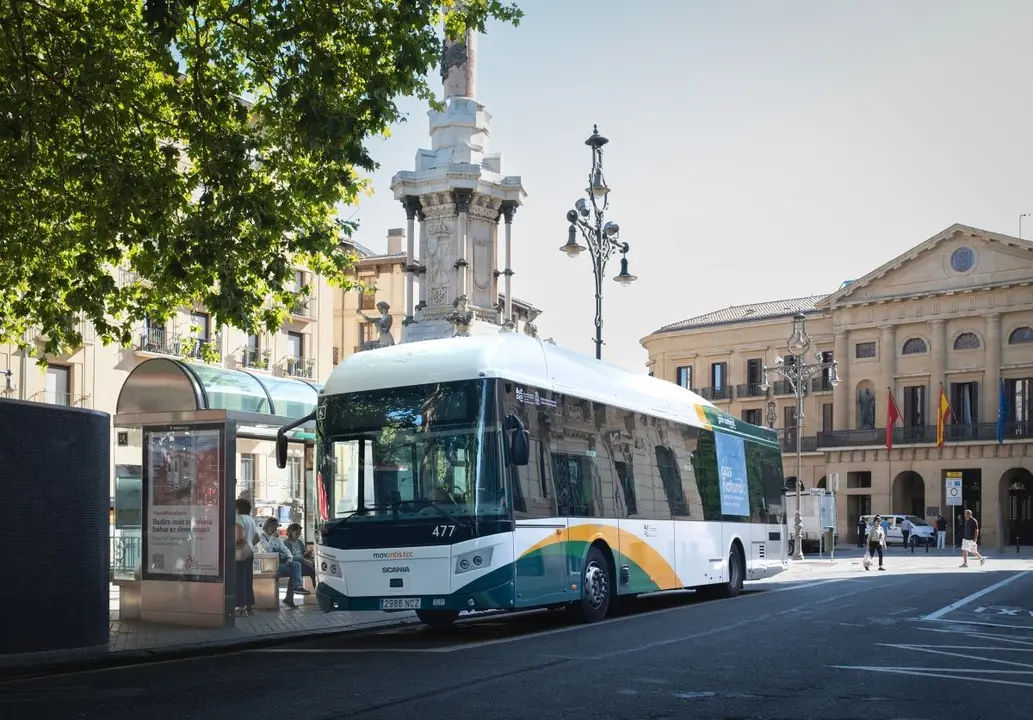Introductie van nieuwe milieuvriendelijke bussen
Deze maand heeft Pamplona zijn openbaarvervoersysteem geüpgraded door de introductie van tien nieuwe bussen aangedreven door gecomprimeerd aardgas (CNG) met een Garantie van Hernieuwbare Oorsprong (GdO). Dit initiatief breidt niet alleen de vloot van het Stedelijk Vervoer (TUC) uit, maar benadrukt ook de toewijding van de stad aan groenere transportoplossingen.
Toekomstige uitbreidingen van de vloot
Vooruitkijkend staat de TUC klaar om later dit jaar zes extra voertuigen te verwelkomen, die ook op aardgas zullen rijden. Deze stap is onderdeel van een bredere strategie die is gericht op het geleidelijk overzetten van de vloot, met een volledige vernieuwing gepland voor 2026.
Dieselmotoren vervangen
De nieuw verworven bussen zijn gefabriceerd door Scania en zijn van het model C 340 C B4x2EB, met een lengte van 12 meter en een royale capaciteit van 92 passagiers, waaronder 24 zitplaatsen. Sinds de introductie van de tweede fase van het TUC's plan voor schonere energie in 2021, dat zich richt op het uitfaseren van dieselbussen, heeft Pamplona met succes 25 CNG-voertuigen in haar dienst opgenomen.
Historisch gezien is diesel de belangrijkste brandstofbron geweest voor het openbaar vervoer in Pamplona sinds de start van de dienst in 1929. De overgang van diesel naar hernieuwbaar aardgas draagt niet alleen bij aan schonere lucht, maar sluit ook aan bij de milieudoelstellingen van Pamplona. Deze verschuiving komt op tijd, aangezien de stad zich voorbereidt op de aanwijzing van een lage-emissiezone, waardoor wordt gegarandeerd dat deze nieuwe bussen "schone voertuigen" zijn die de stedelijke luchtkwaliteit niet aantasten.
Koolstofneutraliteit bereiken
Door het gebruik van hernieuwbaar gas werkt het transportsysteem nu op een CO2-neutrale manier, waarbij het verbruik gelijkstaat aan de biogastoevoer in het netwerk. Deze significante stap is onderdeel van de bredere missie van de Mancomunidad om tegen 2030 CO2-neutraal te zijn, waarmee een precedent wordt geschapen als de eerste lokale overheid in Spanje die hernieuwbaar gas gebruikt voor openbaar vervoer.
Het volgen van de CO2-voetafdruk vermindert
Sinds de Mancomunidad in 2014 begon met het meten en certificeren van de koolstofvoetafdruk van haar diensten, is er een prijzenswaardige vermindering van 30,11% in de koolstofemissies van stedelijk vervoer—een daling van 14.291,4 naar 9.989,4 ton CO2-equivalenten in 2024. Deze vermindering vond plaats ondanks een vlootuitbreiding van 17,31% (een toevoeging van 24 bussen) en een stijging van 6,21% in het aantal jaarlijks afgelegde kilometers.
Toekomstige biogasproductie
In een opwindende ontwikkeling is de Mancomunidad van plan om de komende jaren zijn eigen biogas te produceren, waarbij gebruik wordt gemaakt van slib van de afvalwaterzuiveringsinstallatie van Arazuri en de verwerking van organisch afval in het nieuwe Milieucentrum van Imárcoain. Dit initiatief valt binnen het kader van het lokale beleid inzake de circulaire economie en is gericht op het gebruik van biogas uit het afval van Pamplona om zware voertuigen aan te drijven, waaronder TUC-bussen, afvalwagens en voertuigen voor wateronderhoud.
Na voltooiing van deze productie zal al het organische afval dienen als energie-input voor zware voertuigen, waarmee een pad wordt uitgestippeld voor een duurzamere en efficiëntere toekomst.
Gasinstallaties
In 2022 werd de gasleveringsinfrastructuur buiten de garages aangelegd, waardoor CNG-bussen efficiënt konden tanken. Het systeem haalt gas uit het Nedgia-netwerk, stabiliseert en zet het onder druk via compressoren alvorens het te distribueren. Er zijn twee leveringspunten beschikbaar: één in het tankgebied en één in de buurt van de ingang van de busparking. Er is ook een elektrisch transformatiecentrum met een capaciteit van 1.000 kVA geïnstalleerd om elektrische voertuigladers te ondersteunen, die in toenemende mate in de vloot worden geïntegreerd.
Details van de nieuwe bussen
De tien recent geïntroduceerde starre bussen zijn uitgerust met EURO VI-E technologie motoren die 251 kW (340 pk) produceren. Deze geavanceerde reeks is voorzien van luchtzuiveringssystemen en beveiligingscamera's, waardoor de veiligheid van de passagiers wordt gewaarborgd. Elke bus is voorzien van een dubbele toegangsramp (handmatig en elektrisch) voor personen in een rolstoel, wat de inclusiviteit benadrukt.
Het aankoopcontract voor deze voertuigen werd in september 2024 toegekend, waarbij elke bus ongeveer € 364.750 (exclusief btw) kost, wat resulteert in een totale aanschafprijs van € 3.647.500 (exclusief btw).
Overzicht van de Vloot
Deze nieuwe aanwinsten zijn in gebruik genomen tijdens het recente San Fermín festival. Als gevolg hiervan zullen zeven oudere bussen binnenkort buiten dienst worden gesteld, waardoor het totale aantal voertuigen in de TUC-vloot op 166 komt, met een gemiddelde leeftijd van slechts 6,84 jaar. De vloot omvat 60 gelede voertuigen (18 meter), 104 standaardbussen (12 meter) en 2 kleinere bussen (10 meter). Momenteel bestaat de vloot uit 66 hybride diesel-elektrische bussen, 26 elektrische bussen en 35 bussen die worden aangedreven door hernieuwbaar gas, waardoor 76,5% van de vloot milieuvriendelijk is.
Conclusie
De recente vooruitgang in het openbaar vervoerssysteem van Pamplona benadrukt een toewijding aan duurzaamheid door de introductie van milieuvriendelijke bussen. Hoewel de implicaties van deze ontwikkelingen lokaal lijken, kunnen ze bredere logistieke transformaties inspireren binnen stedelijke transportkaders wereldwijd. Op platformen zoals GetTransport.comkunnen gebruikers toegang krijgen tot betaalbare oplossingen voor vrachtvervoer die aan diverse behoeften voldoen, waaronder het verplaatsen van grote items zoals meubels en voertuigen. Of u nu een kantoorverhuizing plant of betrouwbare bezorgdiensten nodig heeft, GetTransport.com onderscheidt zich als een veelzijdige bron voor efficiënte logistiek.
Samenvattend: nu Pamplona overstapt op schoner vervoer, is er een tastbare kans voor steden wereldwijd om dit voorbeeld te volgen en te navigeren naar duurzamere stedelijke omgevingen. Zelfs de meest uitgebreide rapporten kunnen niet tippen aan het rechtstreeks getuige zijn van vooruitgang, en via GetTransport.com kan vrachtvervoer geregeld worden tegen concurrerende tarieven, waardoor geïnformeerde keuzes gemaakt kunnen worden zonder de bank te breken. Het gemak, de betaalbaarheid en het grote aanbod van GetTransport.com zorgen ervoor dat uw logistieke behoeften soepel en transparant worden ingevuld. Boek nu op GetTransport.com.

 Pamplona introduceert tien nieuwe bussen op gecomprimeerd aardgas">
Pamplona introduceert tien nieuwe bussen op gecomprimeerd aardgas">